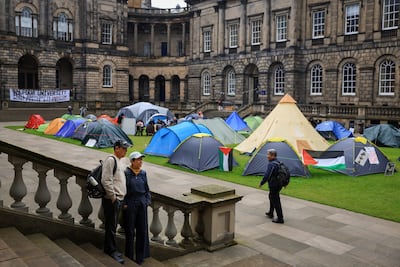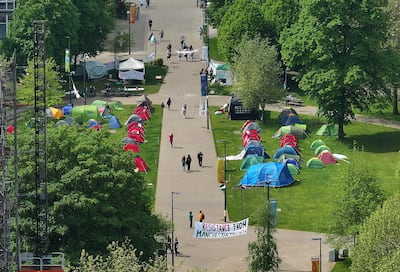Live updates: Follow the latest on Israel-Gaza
UK universities and staff have said they will avoid taking a stance on issues affecting global politics in the future, after pro-Palestinian students accused them of double standards, according to a report.
Dozens of universities across the UK saw students camping out for weeks in protest over Israel’s military campaign in Gaza last year, in a movement that has been compared to the student protests over the US war in Vietnam.
The camps began at the University of Warwick in April last year and spread across 35 more institutions, until the protesters were evicted towards the end of the academic year.

Although they were tolerated on the grounds of freedom of speech, they caused lasting tensions between students and the institution, according to the Higher Education Policy Institute’s report on the pro-Palestine camps and their effects on university life.
Pro-Palestinian protesters accused their universities of “complicity” with Israel, urging them to divest from them and do more to support Palestinian scholarships and link up with universities in Gaza, as they had done for Ukraine.
The strong stance that universities had taken in support of Ukraine after Russia’s invasion, fuelled the protesters' accusations that university administrators were “hypocrites”.
“After Russia invaded Ukraine, [my institution] immediately reviewed all investments, gave special access to wellbeing for Ukrainian students and created research partnerships with [Ukrainian universities]. None of this happened with Palestinian universities," a student protester said in the report.
University staff interviewed for the survey said that the “clear” UK government position on Ukraine and the requirements of research regulators to withdraw funds associated with Russia had made it easier for them to take a position.

But in the Israel-Gaza conflict, they were “caught between” the UK government’s position and the demands of the students. Relations between the university administration and students appeared to have broken down entirely.
Some staff described “extremely difficult meetings” with the protesters, where one vice chancellor complained of being “ranted at” for an hour. Students said they were treated with “suspicion” and “fear”, rather than as “human beings”.
The report also found instances where the protesters were not students or part of the institution – and has called for more measures to prevent such activists from joining the camps.

The camps exacerbated fears of rising anti-Semitism and Islamophobia on campus. Protesters said they experienced Islamophobic discrimination by institutions and students, and some were victims of harassment and assault. Jewish students said that anti-Semitic slogans had been written in Arabic to disguise them, or with the word “Jew” replaced with “Zionist”.
The report suggests more should have been done by the universities to support Jewish students, university staff and the protesters as community tension was raised.
“Now a ceasefire between Israel and Hamas has been signed, it is a good time for universities to reflect on this fraught period of student activism,” said the report’s author, Josh Freeman. “Institutions should learn the lessons of the protests. Supporting the free speech of protesters and others was and should be a key priority.
“More should have been done to support vulnerable members of the academic community, including Jewish students and staff, and the protesters themselves.”
The universities blamed the Office for Students, the regulator in England, for “failing to clarify” the boundaries of free speech on campus. Some slogans that were considered to be anti-Semitic by Jewish student bodies were protected by the Higher Education Act 2023, a law passed by the former Conservative government, which was aimed at defending academic freedom on campus.
The new Labour government announced it would make significant changes to the Act in January, after delaying its implementation. Several universities were called into the Prime Minister’s residence in Downing Street at the time to discuss anti-Semitism, although none said they had changed their behaviour as a result, the report found.
A representative of the Jewish community accused the former government of a “see-saw”approach, whereby it “cared strongly” about anti-Semitism on campus, but was in a difficult position because of the act.
Adam Habib, vice chancellor at the School of Oriental and African Studies University of London, said the report showed universities were a “long way” from living “tolerantly in a cosmopolitan community”.
“If we are going to learn lessons, then we need to agree on the first principles of how we should agree to differ, the parameters of peaceful protest and the accountability mechanisms for those that violate them,” Mr Habib said. “This report suggests that we are a long way from that ideal but it is a necessary starting point in that journey.”


